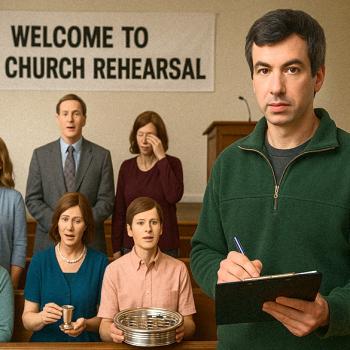
When Jesus said faith could move mountains, I doubt he meant rearranging molehills and calling it holy work. You know, something along the lines of feeding the hungry, helping the poor, or generally being decent humans. But somewhere along the way, that bold notion of mountain-moving faith got hijacked by the urge to make mountains out of molehills—and here we are, surrounded by molehills dressed up as divine duties.
Let’s get real: today’s Christianity has a molehill problem. We’ve traded the radical, world-altering call of faith for a checklist of petty concerns that range from eyebrow-raising to outright ridiculous. If you spend any time in modern church circles, you know what I’m talking about. It’s not uncommon to hear impassioned sermons railing against, say, yoga pants, Halloween costumes, or whether someone’s tattoos might accidentally summon a demon. Forget hunger or justice; we’ve got a “crisis” over whether saying ‘Merry Christmas’ is under attack.
Now, I’m not saying churches shouldn’t have any ideology, but there’s a difference between guiding principles and outright moral gatekeeping. It’s like we’ve become addicted to small “moral” victories that don’t really accomplish anything other than dividing people—and quite possibly inflating some egos along the way. While we’re busy judging everyone else’s streaming habits and wardrobe choices, we’re ignoring the societal mountains that actually need some real faith-driven action.
The Pitfall of Obsessing Over Personal Purity
Take the fixation on personal “purity,” for instance. There are entire ministries dedicated to “keeping young men and women pure,” complete with purity rings, pledges, and cringeworthy rituals that feel more performative than meaningful. The sheer amount of energy poured into these ceremonies and contracts could power a small town. Meanwhile, topics like poverty, homelessness, and systemic injustice are conveniently left for “someone else” to worry about. Because, you know, nothing says “faith” quite like getting worked up over prom dresses while leaving issues of hunger and housing to secular charities.
Then there’s the ever-reliable molehill of personal behavior. Think of the time and energy some churches pour into condemning harmless habits or quirks that have no moral weight at all. TikTok trends? Clearly the downfall of society. Yoga classes? Obviously a fast track to summoning dark forces. Women daring to lead in church? Don’t even get me started. It’s the equivalent of scolding someone for leaving a light on while the whole house is burning down. Yes, technically it’s a thing, but maybe we should deal with the inferno first.
These molehills come with a cost, though. They shape how the world sees the church, and it’s not a flattering picture. Imagine trying to explain to someone outside the faith why churches seem more riled up over what happens in someone’s private life than the fact that children are going hungry in their own communities. The perception becomes one of judgment, hypocrisy, and irrelevance, where Christians seem more interested in moral policing than in actual compassion.
What Would Happen If We Focused on Moving Real Mountains?
It’s worth asking: if Jesus were physically here today, would he be preoccupied with this endless molehill-building? I have a hard time picturing him pulling aside the disciples to address the dangers of Taylor Swift or Wicked. Instead, I think he’d be too busy showing up in places where there’s real need—offering food to the hungry, advocating for the oppressed, and reminding us that faith was supposed to be about lifting each other up rather than tearing each other down.
And here’s the real irony: by focusing on the molehills, we’re not just missing the mountains—we’re actively building a mountain range of obstacles that make it harder for people to connect with the true heart of faith. Every time we obsess over these small “rules” and customs, we create one more barrier for anyone who might be seeking something genuine. We end up making a caricature of faith, one that looks a lot more like control than love.
What would happen if, instead, we shifted our focus back to the actual mountains? What if we spent as much time addressing homelessness as we do hosting debates over what constitutes “appropriate” church attire? What if we poured the same resources into food banks and shelters that we currently pour into anti-Halloween pamphlets? Imagine a church that wasn’t afraid of breaking a sweat for a good cause instead of breaking its back to enforce irrelevant traditions.
Faith That Moves Mountains Isn’t About Building Walls
So here’s a thought experiment for anyone still clutching their pearls over these molehills: Imagine Jesus walking into current reality. What would he have to say about the things that keep us up at night? I have a sneaking suspicion he’d be pointing us toward the mountains we’ve been ignoring, the ones that actually need our faith, our action, and our compassion.
Faith that moves mountains was never about building walls of judgment or hoarding moral victories like treasures in heaven. It’s about breaking barriers, not raising them. Maybe it’s time to let go of our molehills, pick up a little courage, and actually take a swing at the mountains. We might be surprised by how much we can actually move when we stop worrying about what doesn’t matter.














